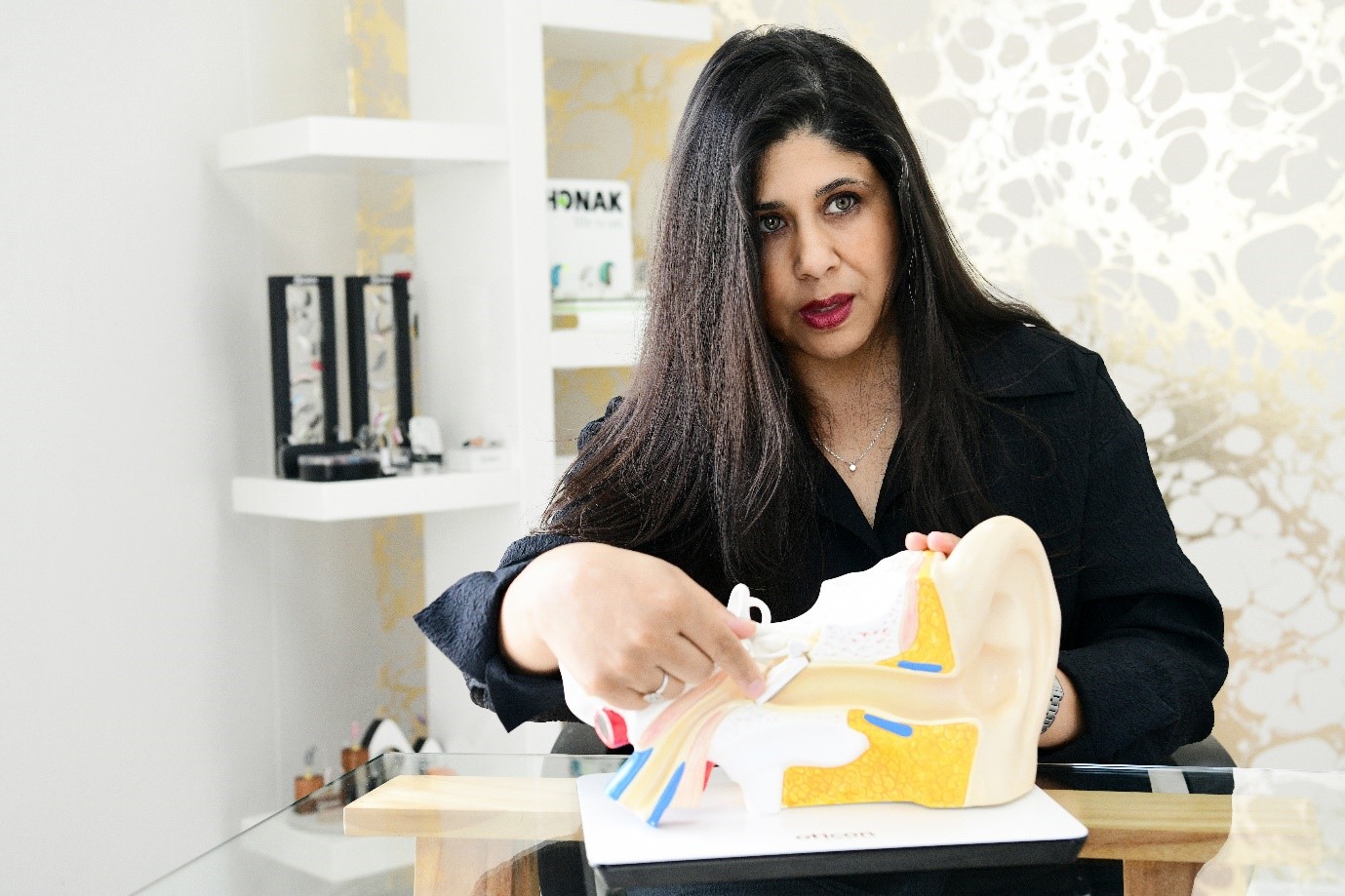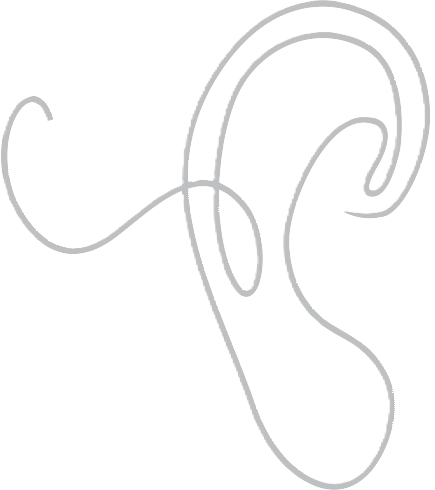Services
Fatima Ganchi Audiologist and Speech Pathologist
Our Audiology & Speech Services

Hearing Aids
Our Practice prides ourselves on staying ahead by investing in state of the art equipment and offering the most technologically advanced hearing aid technology that is personalised to each patient’s individual audiological profile and lifestyle needs. As an independent Practice we offer a diverse portfolio of hearing aid choices that cater to your personal needs.
The benefits of hearing Aids can significantly reduce the impact hearing loss can have on your daily life. They serve to achieve optimal hearing ability in your world, both occupationally and socially
Choosing the right hearing aid With the vast variety of hearing aids available, choosing can be quite overwhelming. This is where our expertise is crucial. We emphasize building relationships with our patients just as much as we strive to make the best choice of hearing aid fitting suited to you.
Hearing Assessment & Evaluation
With state of the art equipment, we strive to accurately measure the type and degree of your hearing impairment, using comprehensive diagnostic tests which assess the outer, middle and inner ear systems. With this information, we will provide advice on the best solution to optimise your hearing potential, we are able to recommend appropriate management including necessary referrals to other healthcare professionals should there be a need.
Hearing Impairment
The eyes are known to be the mirrors of one’s soul, but the ears are the doors to one’s brain and soul!
Human beings were created with senses through which we are able to experience our world, we are created with minds that are open and ready to absorb what each sense will give, enabling us to understand and participate in our world. Every facet of our lives, every need and desire we have is based on what we have learnt from our senses. A human foetus develops basic hearing from 20 weeks of gestation and continues to develop and mature till date of delivery and onwards. As babies, as young children, as adults, we use our hearing every second of every day… Hearing is one of our most precious senses!
The sense of hearing enables human beings to develop language and communication skills which form the basis of every skill required in order to achieve growth and success in the future, allowing for an appreciation of the sounds that enrich today’s world, the ability to learn to read and the luxury to indulge in the sounds of music! At all stages in life, communication and good hearing health connects us to each other, our communities, and the world. For those who have hearing loss, appropriate and timely interventions can facilitate access to education, employment and communications.
How We Hear
In order to fully understand what hearing loss is and the consequences thereof, it is necessary to understand the basic anatomy and function of the hearing system. The human ear consists of three main sections, namely the outer ear, the middle ear and the inner ear. When sound is heard by the ear, sound waves are initially collected by the outer ear or pinna and directed along the ear canal to the eardrum or tympanic membrane. As these sound waves hit the eardrum, their impact creates vibration of this membrane, which in turn then causes the vibratory motion of the the ossicles, the three little bones called the incus, malleus and stapes in the middle ear cavity. The smallest ossicle called the stapes fits into the oval window between the middle and inner ear. When the oval window vibrates, fluid within the inner ear transmits these vibrations into the cochlea, which is a delicate, snail-shaped structure within the inner ear cavity. The cochlea consists of thousands of microscopic outer and inner hair cells which are bent by the wave-like action of the fluid within it. The bending of these hairs sets off nerve impulses which are then passed though the auditory nerve to the hearing center in the brain. This center then translates these nerve impulses into sounds which the brain recognises and decodes into meaning.
Hearing Loss
The fantastic hearing system is so intricate that even the slightest flaw or damage in this complex system can compromise functional and optimal hearing ability. It is not always possible to find the precise cause of one’s hearing loss. There are many causes of hearing loss, including hereditary, pathological (result from disease), physiological (age, degeneration, abuse) and idiopathic (unknown origin). Life happens… we need to be aware that there are conditions and incidents that may occur before birth, during infancy or in childhood and also in adulthood that may affect one’s ability to hear normally.
There are essentially 2 types of hearing loss, namely Conductive hearing loss and Sensorineural hearing loss, and then there can also be the combination of both types, namely Mixed hearing loss.
Conductive hearing loss is a result of sounds being reduced on their way from the outer and / or middle ear to the inner ear. There is thus a decrease in the conduction of sound essentially perceived as a loss of loudness. Depending on the cause of this loss, it may be temporary or permanent. Most conductive hearing losses are able to be treated and resolved with either medical or surgical intervention. In some cases they may not be fully reversed and a hearing aid may be considered beneficial. Some common causes are: Otitis media, a middle ear infection Otitis media from upper respiratory tract infections, sinus infections or exposure to cigarette smoke Perforated tympanic membrane, a hole in the eardrum Cholesteatoma, a cyst in the middle ear cavity Ossicular dysfunction and dislocation, from damage directly to the ossicles Otosclerosis, disease resulting in calcification of one or more of the ossicles Foreign objects such as excessive or impacted ear wax, beads, food, insects Otitis Externa, an infection in the ear canal Collapsed ear canal, especially in the elderly.
Sensorineural hearing loss is caused by damage or dysfunction to the hair cells of the cochlea (sensory) and/ or nerve fibres conducting nerve impulses from the inner ear in the auditory pathway to the brain (neural). Sensorineural hearing loss leads to a loss of both loudness and clarity. Sensorineural hearing loss can be both congenital (present from birth) and acquired at any stage of life. Sensorineural hearing losses are mostly permanent and mostly unable to be resolved with either medical or surgical intervention. In most cases hearing aids and cochlea implants are considered beneficial for achieving optimal communication. Some common causes are: Congenital, from hereditary factors and genetic syndromes Alcohol abuse Loud noise exposure Ototoxicity from medication and recreational drugs In-Utero infections during pregnancy Severe infections such as mumps, measles, meningitis Age & degeneration Injuries & physiological trauma
Mixed hearing loss is caused by a combination of the other two types of hearing loss. Occasionally a combination of factors occur which can affect the outer middle and inner ears. In these cases there is both the loss of conduction and loudness of sound as well as loss in the detection and discrimination of sound.
Adults and Hearing Loss
It is a common thought that most people associate hearing loss with old age. Significant declines in hearing are associated with measurable cognitive decline in older people. Current global research suggests that hearing impairment may increase listening effort resulting in people having fewer cognitive resources available for other mental functions. Hearing is cognitively taxing.
Consequently, these brain problems then become life problems. Inadequate treatment of hearing impairment with limited access to appropriate sounds indirectly impacts cognition and can lead to loneliness, social isolation and depression or reduced self-efficacy, and these in turn may further lead to reduced cognitive performance and increased risk of depression, anxiety and dementia. People with hearing impairment are known to socialise less or even socially withdraw entirely as they are unable to cope with complex sound environments and intellectually stimulating conversations.
Hearing Protection
Your hearing is one of your most important senses, and often needs protecting in so many aspects of your life. Our Practice can offer custom made hearing protection for a variety of hearing health concerns. Swim Plugs These are ideal for patients with grommets or with chronic ear infections and anyone who dislikes water getting into their ears. We provide both generic off the shelf products as well as custom-made swim plugs in a variety of colours. Sleep plugs Struggling with a partner who snores or neighborhood noise, we have the perfect solution. We supply custom-made comfortable sleep plugs which will help you achieve a silent night’s rest. Noise Plugs Exposure to occupational noise is not always avoidable, and it is imperative to protect your ears whilst you work. We supply small, comfortable and affordable custom-made hearing protectors. These protectors have incorporated speech filters enabling you to continue wearing them whilst working. They are low maintenance, easy to fit and comfortable to wear.
Medico-Legal Assessments
Our Practice offers audiological assessments for medico-legal purposes, such as when clients have been involved in motor vehicle accidents
Newborn Hearing Screening
Hearing screening for new born babies is offered in order to focus specifically on the early detection of permanent congenital hearing loss in new born babies. The primary goal is to identify babies with hearing loss at an early age, thus ensuring that the appropriate follow-up and treatment and management can be recommended.
Hearing and listening form the invisible cornerstones of communication. The importance of hearing to the communication and learning process tends to be significantly underestimated because hearing impairment is invisible; thus the effects of hearing impairment often are associated with problems or causes other than the hearing impairment. A delay in the diagnosis of hearing impairment as well as the effects of even a mild hearing loss on speech and language development during the critical first 2-3 years of life may serve to significantly impede speech, language, social, emotional and cognitive development.
Occurrence of hearing loss: Every day in South Africa, 12-18 babies are born with permanent hearing loss. The prevalence of hearing loss is more than 10 times higher for babies in the Neonatal ICU. The incidence of some degree of significant permanent sensorineural hearing loss is estimated to be present in 1-3 per 1000 new born infants in the well-baby nursery population, and in 2-4 per 100 new born babies in the NNICU population.
How is a new born baby’s hearing tested? A new born baby’s hearing mechanism is able to be assessed as soon as the second day after birth, the screening takes only a few minutes and the results are available immediately. The screening is quick, non-invasive and painless. Objective physiological measurements are used for assessment, namely an OAE or AABR, and they are not dependent on the baby’s response.
Tinnitus Management
One of the most common causes of tinnitus is undiagnosed hearing loss. Don’t let tinnitus keep you from enjoying life to the fullest. The hearing care professionals at Fatima Ganchi offer several methods and approaches for managing tinnitus.
In-Hospital Adult Dysphagia
Dysphagia is the difficulty or inability to swallow. In-hospital assessment and management of dysphagia is offered within a multidisciplinary team of medical professionals.
In-Hospital Adult Speech and Language Therapy
Acquired speech and language difficulties may arise from a variety of causes. Some of these include stroke, brain injury, acquired progressive illness, head and neck cancers, dementia, motor neuron disease and Parkinson’s disease. In hospital assessment and management of adult acquired speech and language difficulties is offered within a multidisciplinary team of medical professionals
